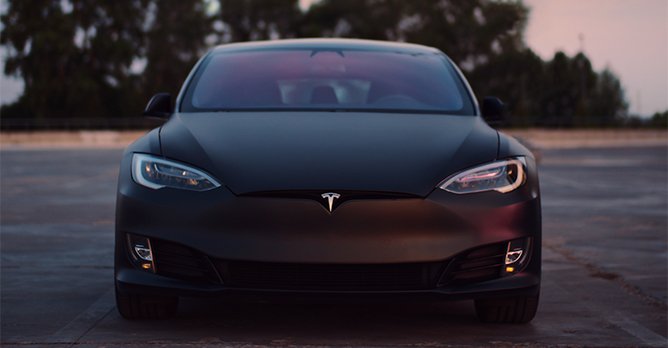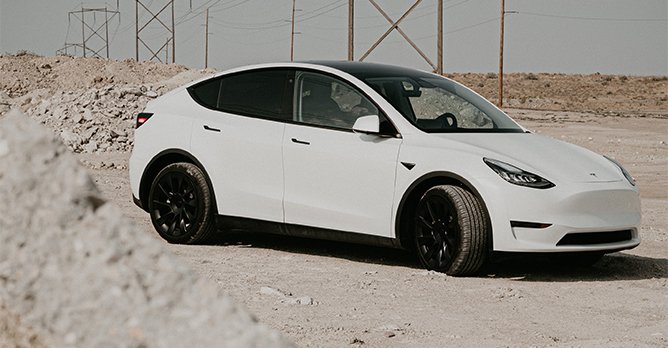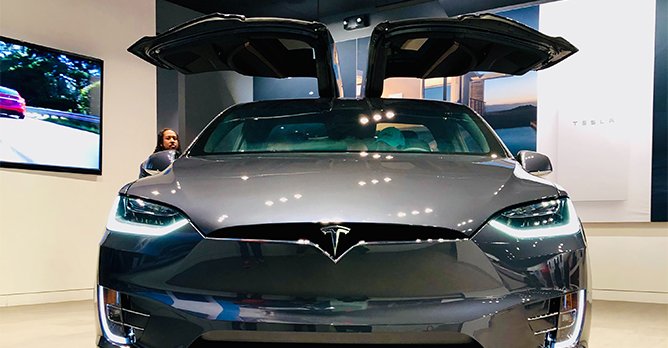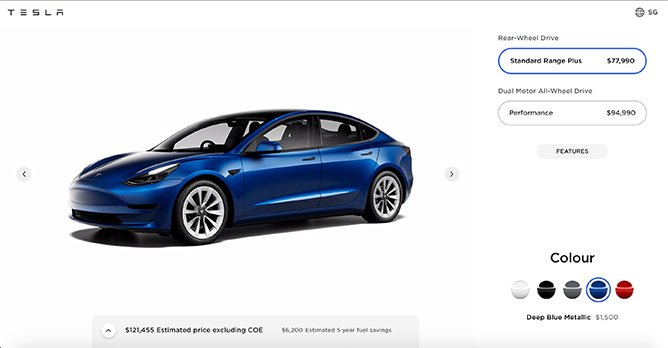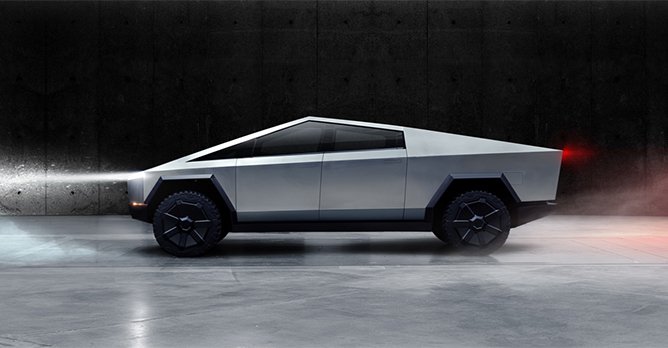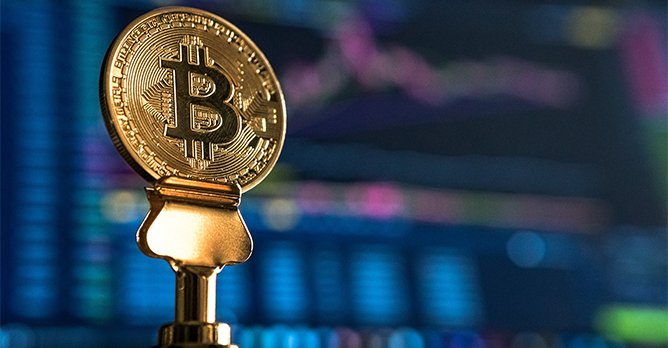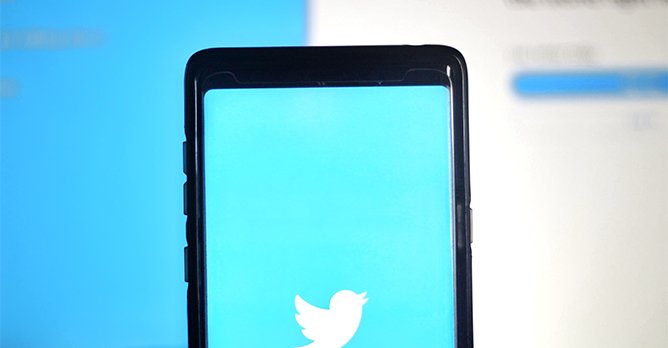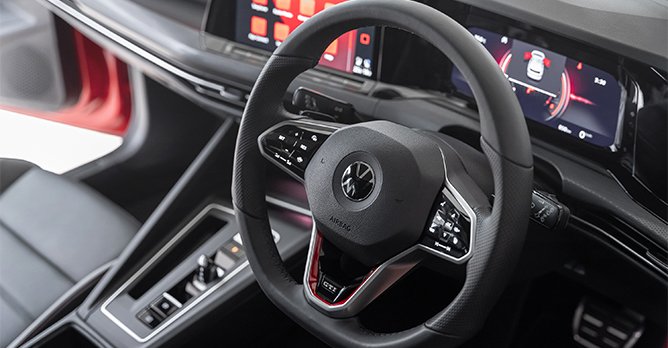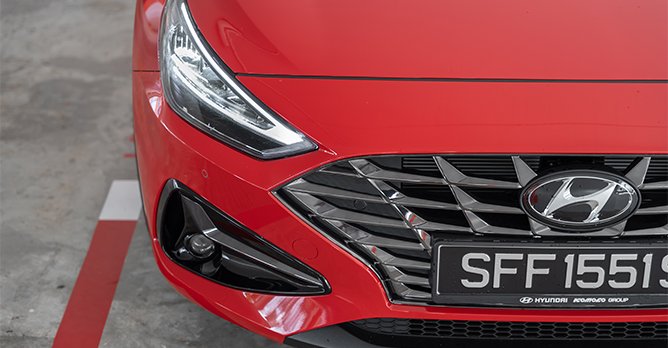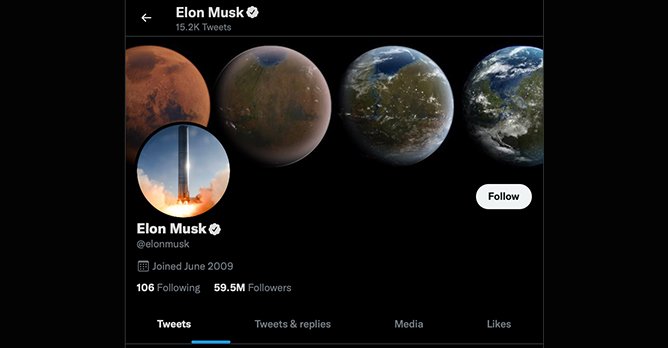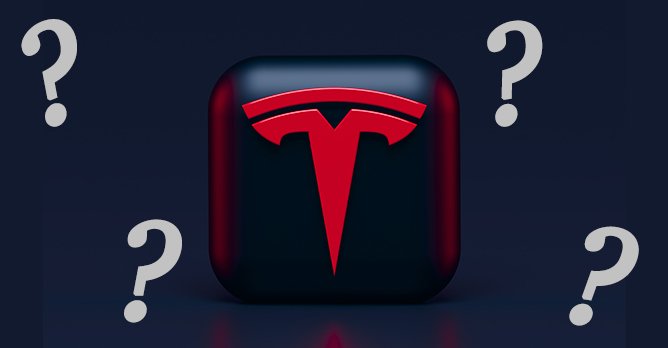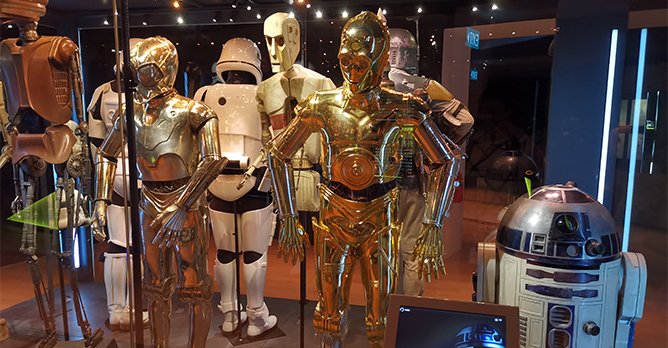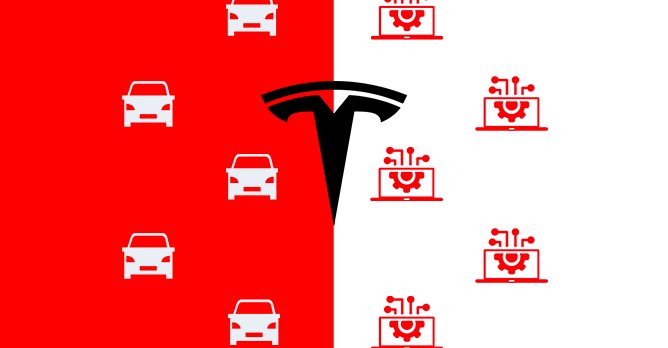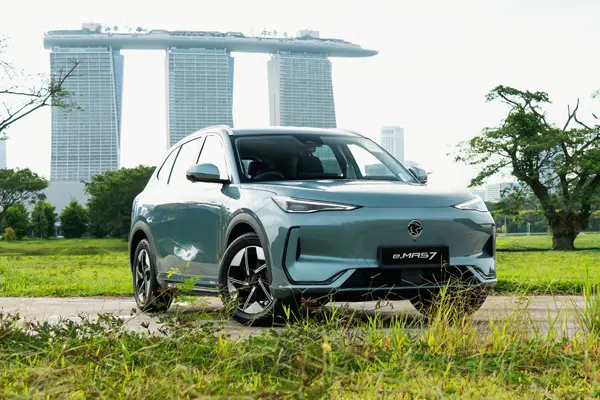Why on earth can't we take our eyes off of Tesla?
14 Sep 2021|11,845 views
Tesla.
The name feels like it's been around forever, doesn't it?
The seemingly unstoppable rise of the electric carmaker over just the last 10 years - counting the Model S' debut as the starting line for the general public - has stolen the eyeballs of even those indifferent to cars. It has sent executives everywhere from Volkswagen to Honda scrambling.
Even now, it's amazing to behold exactly how Tesla has managed to make its mark concomitantly in the tech and car industry - both known for their ridiculously high barriers to entry.
Undeniably, Teslas are special. Built from the ground up fully-electric, stuffed with forward-thinking bits of tech and gadgetry, and boasting the best EV batteries. Even after larger rivals have spent years and substantial money to bring their A-game to the E-game (hello Audi and BMW), Tesla is still running laps around the competition when it comes to building EVs. As a bonus, its current model line-up is also gorgeous.
But that's not all to the story.
One other big reason may explain why the electric carmaker has grown so rapidly: Its ability to dominate both news headlines and pop culture discussions. Often, through controversy, and often, spearheaded by its CEO and self-declared Technoking: Elon Musk.
Two is better than one for marketing…?
In understanding Tesla's magnetic effect on the news cycle, it may help to think of its brand image as forking out constantly into two different entities, running alongside each other. Although they appear quite different, they actually work together seamlessly in a somewhat symbiotic relationship to create Tesla, the tech start-up and revolutionary EV-maker, as we see it.
The first of the two entities simply comprises Tesla's line-up of its four models - the S, X, 3 and Y (in order of release). Tesla, as a brand, rises and falls purely on the basis of its engineering strength, technical prowess, and how successfully it markets these specific "products".
How well do the cars drive? How good is their range? What sorts of game-changing tech do they offer? For these sorts of questions, the answers are usually more positive than negative. In spite of reported build flaws and reliability issues, public opinion is generally more than favourable. Even the harshest critics appreciate that Tesla has tried to push the boundaries of carmaking with its vehicles.
Compounding its hyper-contemporary image is Tesla's unorthodox method of running the entire show on its own: By cutting out local dealerships and pushing its cars straight to the customer.
If you've cared enough to explore the Singapore website, you'll notice how the Model 3s are sold just like any other high-end tech product listed on an official online store, except with a six-figure price tag, of course.
Starting off with your desired variant - the Standard or the Performance for you, Sir/Madam? - you proceed to select the colour that you want for your new ride (I've chosen Deep Blue Metallic, which adds $1,500). Fancy self-driving tech? That's possible too, at an extra $11,500. You end off with a deposit if you're certain, which you pay for by entering your credit card details. If the entire process reminds you of pre-ordering the latest iPhone, you're not alone.
And what a fascinating impression of Tesla all of this creates. End to end, buying and then owning one of its cars is a thrilling experience no other automaker is able to emulate. This is the kind of novel, captivating stuff that unremittingly steals eyeballs and allows Tesla to stand out in a crowded field of auto and tech players.
The more bizarre and deplorable underbelly
But then the other entity is a bit more… divisive. This part is fuelled more by outlandish announcements, by flashy press conferences, and by Tweets - yes, just Tweets - which latch themselves onto headlines everywhere (or as Musk would argue, that headlines everywhere latch onto).
On the more innocuous end, we've had disappointing "product launches", like the underwhelming first presentation of the Loop. Musk's vision of futuristic, high-speed underground transportation had unravelled itself to be quite different from what was initially promised, to put things lightly (we'll leave you to this spectrum of reactions back then). There was also the unintended smashing of the Cybertruck's supposedly "armour windows" during its debut demonstration.
All of this is very confusion-inducing and confidence-deflating, yes, but nonetheless also harmless in the grander scheme of things. This is the world of start-ups after all, where small failures often precede bigger successes.
But dig a little deeper and the waters become a bit murkier.
On the more questionable, even insidious end, Musk has had a documented history of irresponsible and, arguably, unnecessarily egomaniacal behaviour - especially on Twitter. With quite far-reaching consequences at times.
Think of the outsized impact his declarations have had on Bitcoin prices, intentionally or otherwise. For a currency that was originally intended to be decentralised, economic analysts have voiced concerns about the influence one Elon Musk can wield on how much, and when, prices fluctuate.
Or think of his spat with the British diver who helped rescue a group of teenage boys stuck in a flooded cave in Thailand.
What started out as admittedly quite harsh criticism from the diver - he had dismissed Musk's proposal to build a rescue submarine as a PR stunt - ended with both individuals going to court for a defamation suit. (Musk had labelled the diver as a "pedo guy" in a Tweet.) The question on every investor's and casual observer's minds: Why waste time and money - why bother - getting into something completely avoidable like that?
Then there is Musk's tendency to exaggerate the self-driving capabilities of Teslas. In spite of marketing (and selling) the system as "Full Self-Driving" for years, experts say that the tech offered is in reality closer to a highly sophisticated version of driver assistance. A leaked memo within the company even refuted Musk's recent claims that Teslas would be fully autonomous by the end of the year.
Teflon Tesla: No good or bad press, just press?
With all the preceding talk about Tesla, you might have momentarily contemplated a long-held, widespread belief: That there can be no good or bad press, just press, full stop.
But reality doesn't always agree. Studies have shown that bad press functions differently based on the pre-existing state of the company or name it affects. Generally, beneficiaries tend to be smaller names that haven't yet established a solid brand image and would do good simply with more publicity. Bigger ones, on the other hand, may risk reputations built over a long period.
Following this logic, Tesla continues to confound as a case study.
On the one hand, one could say that the carmaker is still a small player, if we're just stacking its production levels against anyone in the Top 10. Last year, Number 10 was Hyundai - it managed to deliver a very respectable total of 3.74 million cars. Tesla didn't even cross the half million mark (although it got close) despite hitting a sales milestone.
Under other metrics, though, this impression doesn't hold the same. An analysis showed Tesla trailing only BMW and Audi in terms of brand mentions across Facebook, Instagram and Twitter, back in 2017. It's almost guaranteed that it has taken the lead four years later. Its market cap has also swelled to overtake that of the biggest nine automakers - combined.
Most impressively, Tesla does this with arguably far less effort devoted than every other carmaker; in late 2020, news slipped out that its official PR department had been quietly dissolved. But again, few CEOs in the world (not just among carmakers) can boast an eye-watering Twitter following of almost 60 million, or host SNL. Meanwhile, throw the name Hans Dieter Pötsch out and you'd probably get blank stares and polite, lost smiles: "Say that again?" (He's the Chairman of World No. 2 VW Group's supervisory board).
In the present moment, Tesla still occupies a paradoxical, liminal position of underdog, yet also giant. It has indeed carved out a predictable reputation for itself, but it is a reputation for being unpredictable. As such, the good or bad press conundrum vis-a-vis company size doesn't apply perfectly to it. Controversy after controversy hits the headlines, but like Teflon, none of the negativity truly sticks to the brand for very long. Meanwhile, the spotlight on Tesla keeps getting hotter.
An odd mix that is still working so far
Combined with a novelty factor, the two parts of Tesla's brand have perhaps formed a perplexing, but nonetheless well-oiled machine that continues to buttress its standing in the automotive industry.
The semi-regular controversy drives visibility, an endless list of New Stuff On The Horizon is thrown into the mix, and the cars sell well as their own product after the heightened exposure.
Wash, rinse, repeat.
It's important to note here that Tesla's ginormous market cap isn't so much a reflection of its sales figures - the sovereign determinant of brand value in the automotive industry traditionally. Rather, its few hundred billion dollar-valuation is more a reflection of its expected growth, in the vein of other start-ups turned mega-businesses like Uber. What will Tesla do next? What other untapped potential does it possess? Therein lies the eager anticipation.
Tesla knows this. Musk knows this.
At Tesla's AI Week recently, he made bullish announcements that the company intends to build humanoid robots to assist us with our everyday, mundane tasks, and by next year too. While serving up yet another round of excitement and buzz, these were quickly questioned and then tossed out (again) - as is the routine now, it seems.
It would be unfair to accuse Musk of selling unrealistic visions in bad faith - he's no Elizabeth Holmes, that's for sure. We have the Teslas that he once promised years ago. There is no doubt too that the other ventures he is attempting are driven by an innate desire to push the limits of research and development in the field of technology.
But at the end of the day, it genuinely doesn't matter too much to him whether or not Tesla's I, Robot-lookalikes get built on time. Or even if the Full Self-Driving system, isn't, well, full self-driving.
At least not yet.
Whichever you prefer to label it, tech start-up or electric carmaker, Tesla is still grabbing the headlines. And increasingly, a larger slice of the pie in the automotive market and financial market as well.
That's more than enough for it to feed on presently. As for us... we'll be watching. We always have been.
Tesla.
The name feels like it's been around forever, doesn't it?
The seemingly unstoppable rise of the electric carmaker over just the last 10 years - counting the Model S' debut as the starting line for the general public - has stolen the eyeballs of even those indifferent to cars. It has sent executives everywhere from Volkswagen to Honda scrambling.
Even now, it's amazing to behold exactly how Tesla has managed to make its mark concomitantly in the tech and car industry - both known for their ridiculously high barriers to entry.
Undeniably, Teslas are special. Built from the ground up fully-electric, stuffed with forward-thinking bits of tech and gadgetry, and boasting the best EV batteries. Even after larger rivals have spent years and substantial money to bring their A-game to the E-game (hello Audi and BMW), Tesla is still running laps around the competition when it comes to building EVs. As a bonus, its current model line-up is also gorgeous.
But that's not all to the story.
One other big reason may explain why the electric carmaker has grown so rapidly: Its ability to dominate both news headlines and pop culture discussions. Often, through controversy, and often, spearheaded by its CEO and self-declared Technoking: Elon Musk.
Two is better than one for marketing…?
In understanding Tesla's magnetic effect on the news cycle, it may help to think of its brand image as forking out constantly into two different entities, running alongside each other. Although they appear quite different, they actually work together seamlessly in a somewhat symbiotic relationship to create Tesla, the tech start-up and revolutionary EV-maker, as we see it.
The first of the two entities simply comprises Tesla's line-up of its four models - the S, X, 3 and Y (in order of release). Tesla, as a brand, rises and falls purely on the basis of its engineering strength, technical prowess, and how successfully it markets these specific "products".
How well do the cars drive? How good is their range? What sorts of game-changing tech do they offer? For these sorts of questions, the answers are usually more positive than negative. In spite of reported build flaws and reliability issues, public opinion is generally more than favourable. Even the harshest critics appreciate that Tesla has tried to push the boundaries of carmaking with its vehicles.
Compounding its hyper-contemporary image is Tesla's unorthodox method of running the entire show on its own: By cutting out local dealerships and pushing its cars straight to the customer.
If you've cared enough to explore the Singapore website, you'll notice how the Model 3s are sold just like any other high-end tech product listed on an official online store, except with a six-figure price tag, of course.
Starting off with your desired variant - the Standard or the Performance for you, Sir/Madam? - you proceed to select the colour that you want for your new ride (I've chosen Deep Blue Metallic, which adds $1,500). Fancy self-driving tech? That's possible too, at an extra $11,500. You end off with a deposit if you're certain, which you pay for by entering your credit card details. If the entire process reminds you of pre-ordering the latest iPhone, you're not alone.
And what a fascinating impression of Tesla all of this creates. End to end, buying and then owning one of its cars is a thrilling experience no other automaker is able to emulate. This is the kind of novel, captivating stuff that unremittingly steals eyeballs and allows Tesla to stand out in a crowded field of auto and tech players.
The more bizarre and deplorable underbelly
But then the other entity is a bit more… divisive. This part is fuelled more by outlandish announcements, by flashy press conferences, and by Tweets - yes, just Tweets - which latch themselves onto headlines everywhere (or as Musk would argue, that headlines everywhere latch onto).
On the more innocuous end, we've had disappointing "product launches", like the underwhelming first presentation of the Loop. Musk's vision of futuristic, high-speed underground transportation had unravelled itself to be quite different from what was initially promised, to put things lightly (we'll leave you to this spectrum of reactions back then). There was also the unintended smashing of the Cybertruck's supposedly "armour windows" during its debut demonstration.
All of this is very confusion-inducing and confidence-deflating, yes, but nonetheless also harmless in the grander scheme of things. This is the world of start-ups after all, where small failures often precede bigger successes.
But dig a little deeper and the waters become a bit murkier.
On the more questionable, even insidious end, Musk has had a documented history of irresponsible and, arguably, unnecessarily egomaniacal behaviour - especially on Twitter. With quite far-reaching consequences at times.
Think of the outsized impact his declarations have had on Bitcoin prices, intentionally or otherwise. For a currency that was originally intended to be decentralised, economic analysts have voiced concerns about the influence one Elon Musk can wield on how much, and when, prices fluctuate.
Or think of his spat with the British diver who helped rescue a group of teenage boys stuck in a flooded cave in Thailand.
What started out as admittedly quite harsh criticism from the diver - he had dismissed Musk's proposal to build a rescue submarine as a PR stunt - ended with both individuals going to court for a defamation suit. (Musk had labelled the diver as a "pedo guy" in a Tweet.) The question on every investor's and casual observer's minds: Why waste time and money - why bother - getting into something completely avoidable like that?
Then there is Musk's tendency to exaggerate the self-driving capabilities of Teslas. In spite of marketing (and selling) the system as "Full Self-Driving" for years, experts say that the tech offered is in reality closer to a highly sophisticated version of driver assistance. A leaked memo within the company even refuted Musk's recent claims that Teslas would be fully autonomous by the end of the year.
Teflon Tesla: No good or bad press, just press?
With all the preceding talk about Tesla, you might have momentarily contemplated a long-held, widespread belief: That there can be no good or bad press, just press, full stop.
But reality doesn't always agree. Studies have shown that bad press functions differently based on the pre-existing state of the company or name it affects. Generally, beneficiaries tend to be smaller names that haven't yet established a solid brand image and would do good simply with more publicity. Bigger ones, on the other hand, may risk reputations built over a long period.
Following this logic, Tesla continues to confound as a case study.
On the one hand, one could say that the carmaker is still a small player, if we're just stacking its production levels against anyone in the Top 10. Last year, Number 10 was Hyundai - it managed to deliver a very respectable total of 3.74 million cars. Tesla didn't even cross the half million mark (although it got close) despite hitting a sales milestone.
Under other metrics, though, this impression doesn't hold the same. An analysis showed Tesla trailing only BMW and Audi in terms of brand mentions across Facebook, Instagram and Twitter, back in 2017. It's almost guaranteed that it has taken the lead four years later. Its market cap has also swelled to overtake that of the biggest nine automakers - combined.
Most impressively, Tesla does this with arguably far less effort devoted than every other carmaker; in late 2020, news slipped out that its official PR department had been quietly dissolved. But again, few CEOs in the world (not just among carmakers) can boast an eye-watering Twitter following of almost 60 million, or host SNL. Meanwhile, throw the name Hans Dieter Pötsch out and you'd probably get blank stares and polite, lost smiles: "Say that again?" (He's the Chairman of World No. 2 VW Group's supervisory board).
In the present moment, Tesla still occupies a paradoxical, liminal position of underdog, yet also giant. It has indeed carved out a predictable reputation for itself, but it is a reputation for being unpredictable. As such, the good or bad press conundrum vis-a-vis company size doesn't apply perfectly to it. Controversy after controversy hits the headlines, but like Teflon, none of the negativity truly sticks to the brand for very long. Meanwhile, the spotlight on Tesla keeps getting hotter.
An odd mix that is still working so far
Combined with a novelty factor, the two parts of Tesla's brand have perhaps formed a perplexing, but nonetheless well-oiled machine that continues to buttress its standing in the automotive industry.
The semi-regular controversy drives visibility, an endless list of New Stuff On The Horizon is thrown into the mix, and the cars sell well as their own product after the heightened exposure.
Wash, rinse, repeat.
It's important to note here that Tesla's ginormous market cap isn't so much a reflection of its sales figures - the sovereign determinant of brand value in the automotive industry traditionally. Rather, its few hundred billion dollar-valuation is more a reflection of its expected growth, in the vein of other start-ups turned mega-businesses like Uber. What will Tesla do next? What other untapped potential does it possess? Therein lies the eager anticipation.
Tesla knows this. Musk knows this.
At Tesla's AI Week recently, he made bullish announcements that the company intends to build humanoid robots to assist us with our everyday, mundane tasks, and by next year too. While serving up yet another round of excitement and buzz, these were quickly questioned and then tossed out (again) - as is the routine now, it seems.
It would be unfair to accuse Musk of selling unrealistic visions in bad faith - he's no Elizabeth Holmes, that's for sure. We have the Teslas that he once promised years ago. There is no doubt too that the other ventures he is attempting are driven by an innate desire to push the limits of research and development in the field of technology.
But at the end of the day, it genuinely doesn't matter too much to him whether or not Tesla's I, Robot-lookalikes get built on time. Or even if the Full Self-Driving system, isn't, well, full self-driving.
At least not yet.
Whichever you prefer to label it, tech start-up or electric carmaker, Tesla is still grabbing the headlines. And increasingly, a larger slice of the pie in the automotive market and financial market as well.
That's more than enough for it to feed on presently. As for us... we'll be watching. We always have been.
Thank You For Your Subscription.














